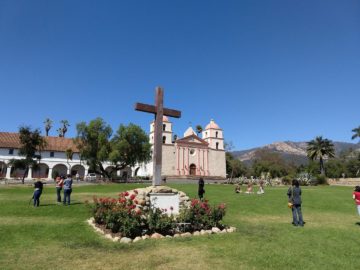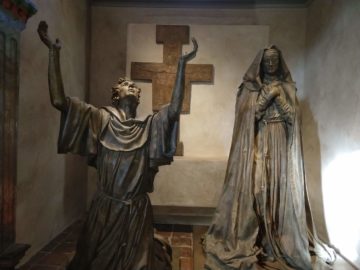During this week of thoughtfully focusing our attention on St. Francis of Assisi, we offer a Franciscan Gospel reflection and questions written by Fr. Paul Gallagher, OFM for your prayer. They are edited by Franciscan Sister of Christian Charity Sister Anne Marie Lom and Joe Thiel. The excerpts from the Sunday readings are prepared by Joe Thiel. To read or download the complete pdf with excerpts for your prayer, please click here: Franciscan Gospel Reflections October 6 2019. Excerpts are from the Lectionary for Mass for Use in the Dioceses of the United States of America, second typical edition © 2001, 1998, 1997, 1986, 1970 Confraternity of Christian Doctrine, Inc., Washington, DC. Used with permission. All rights reserved. No portion of this text may be reproduced by any means without permission in writing from the copyright owner. Photos: Santa Barbara Mission, Santa Barbara, California
Luke 17:5-10
And the apostles said to the Lord, “Increase our faith.” The Lord replied, “If you have faith the size of a mustard seed, you would say to this mulberry tree, ‘Be uprooted and planted in the sea,’ and it would obey you.
“Who among you would say to your servant, who has just come in from plowing or tending sheep in the field, ‘Come here immediately and take your place at table?’ Would he not rather say to him, ‘Prepare something for me to eat? Put on your apron and wait on me while I eat and drink. You may eat and drink when I am finished.’ Is he grateful to that servant because he did what was commanded? So should it be with you. When you have done all you have been commanded, say, ‘We are unprofitable servants; we have done what we were obliged to do.’”
BACKGROUND:
There are just five verses between this gospel text and the parable of the Rich Man and Lazarus, the text from this past Sunday’s gospel. In those five verses Jesus addresses the disciples about the inevitability of sin. While sin may be inevitable, its consequences are still tragic, especially when it leads others to sin. Therefore, Jesus urges the disciples to confront the sinner, so the sinner can turn away from the sin. At the same time, the one who falls should be forgiven, seven times a day if need be. This teaching about sin leads the apostles to realize they are in need of much greater faith, which leads to the gospel for this week.
The text contains two instructions to the disciples. The first is about faith, which might be better understood as loyalty. The request posed by the apostles asks for an increase in faith. Jesus’ response moves their request for more faith to a question about the quality of faith. The seed of the mulberry is very small, but the tree itself has an extensive root system that makes it very difficult to be uprooted. Jesus suggests that even with a small grain of faith the size of a mustard seed, something as difficult as transplanting a mulberry could be accomplished. This teaching tool uses an image that would have been obvious in the agrarian culture of the day.
The second teaching in this text is in the form of a parable. It uses the roles of servants and masters as a model for discipleship. Family servants were common in the time of Jesus. Even a poor family might have had one servant who would have worked both in the fields and in the house. One reason for this situation was that families who were in dire situations would give one or two of their children to another family as a servant, so that the child might at least be assured of having sufficient food. Many of us, trying to draw meaning for our lives from this text, would find the everyday situation that is the backdrop for this gospel to be unimaginable in our own day.
Another struggle some of us might have is the way the master treats the servant in the parable. Part of this struggle may come from what Jesus instructs that a servant should say when they have completed all their assigned duties. “We are unprofitable servants; we have done what we were obliged to do.” In other translations the word unprofitable had been rendered as “worthless.” At least one scripture scholar suggests that either would have been better rendered “without need.” The New English Bible translates the line “We are servants and deserve no credit.”
Recall that this parable is told in response to the disciples asking that their faith be increased. The focus of Jesus’ response is on the role of the disciple. If the disciples were asking that God increase their faith in the manner that one adds some warm fresh coffee to a cup that has grown cold, Jesus’ response may not be what they were hoping to hear.
DISCUSSION QUESTIONS:
1. When you think of the word “servant,” what images and feelings come to mind?
2. Have there been times in your life when you were grateful to have people who took on roles of service for you, or for someone you loved?
3. Have there been times when you wished that you could have performed some acts of service for another?
4. If you think of faith as loyalty, where in your life do you see manifestations of great faith? Where do you find signs of fractured loyalty?
5. To what in nature would you compare your faith?
6. When you hear the disciples ask Jesus to increase their faith in this text, you find yourself…
7. Can you take some time now to talk to God about what is most important to you in this gospel text? Speak openly and honestly about your feelings, and let the words come from your heart and from your desire.





